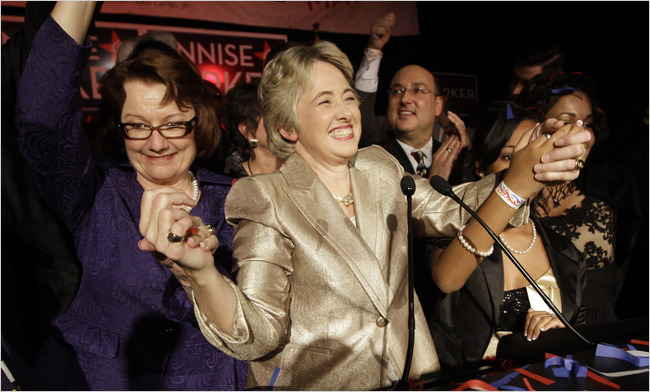Houston’s Lesbian Mayor

Houston Mayor-elect Annise Parker, center, celebrates with her partner Kathy Hubbard, left, Parker's runoff election victory at a campaign party on Saturday in Houston. David J. Phillip/Associated Press
I’d bet more Americans could name the head coach of the Houston Texans than the mayor of Houston, Texas. And that’s saying something, because the Texans aren’t very good. Nonetheless, the results of the Houston mayoral race is the top story in the blogosphere this morning. Not that there’s anything wrong with that.
Houston became the largest city in the United States to elect an openly gay mayor on Saturday night, as voters gave a solid victory to the city controller, Annise Parker.
Cheers and dancing erupted at Ms. Parker’s campaign party as her opponent, Gene Locke, a former city attorney, conceded defeat just after 10 p.m. when it became clear he could not overcome her lead.
Twenty minutes later, Ms. Parker appeared before ecstatic supporters at the city’s convention center and then joked that she was the first graduate of Rice University to be elected mayor. (She is, by the way.) Then she grew serious. “Tonight the voters of Houston have opened the door to history,” she said, standing by her partner of 19 years, Kathy Hubbard, and their three adopted children. “I acknowledge that. I embrace that. I know what this win means to many of us who never thought we could achieve high office.”
[…]
Throughout the campaign, Ms. Parker tried to avoid making an issue of her sexual orientation and emphasized her experience in overseeing the city’s finances. But she began her career as an advocate for gay rights in the 1980s, and it was lost on no one in Houston, a city of 2.2 million people, that her election marked a milestone for gay men and lesbians around the country.
Several smaller cities in other regions have chosen openly gay mayors, among them Providence, R.I., Portland, Ore., and Cambridge, Mass. But Ms. Parker’s success came in a conservative state where voters have outlawed gay marriage and a city where a referendum on granting benefits to same-sex partners of city employees was soundly defeated.
Turnout was light across the city on a rainy, foggy day, with only about 16 percent of registered voters going to the polls.
Ms. Parker’s sexual orientation did not become an issue in the race until after the general election produced no winner and led to a run-off between her and Mr. Locke, who is black and enjoys strong support among African-American voters.
[…]
But the ugliest attacks came from a group of black pastors who spoke out against Ms. Parker for what they called her gay agenda and two separate anti-gay advocates who sent out fliers in the mail calling attention to her support from gay groups and to her relationship with her partner. Mr. Locke denied having anything to do with the attacks, but two members of his finance committee gave $40,000 to help finance one of the mailings.
Some national gay-rights groups, meanwhile, came to the aid of Ms. Parker’s campaign with money and volunteers to man telephone banks in a get-out-the-vote effort and to urge her likely supporters to vote.
Political strategists said that to win, Mr. Locke needed to carry a large majority of the black vote, which is usually around a third of the turnout, and to attract significant support from conservative whites, many of them Republicans, who are also about a third of the voting mix here.
[…]
Ms. Parker appeared to have cobbled together a winning coalition of white liberals and gay people, who were expected to turn out in large numbers.
I’m honestly not sure that we can draw major conclusions from run-off elections in off years. When only 16 percent of registered voters bother to show up, it’s not exactly a popular referendum. And that’s especially true in an open primary like this one, where the top two vote-getters are liberal Democrats.
Interestingly, Houston is the 4th largest city (ranked by population) in the United States. Everybody knows that New York, Los Angeles, and Chicago are the top three. But while it gets only a fraction of the attention, Houston is only somewhat smaller (2.2M vs 2.8M) than Chicago and is leaps and bounds ahead of the 5th largest city, Philadelphia (1.4M). Even if we rank cities by the way we think of them — considering the suburbs and the broader metropolitan areas, not just the people living within the city limits — the Houston area is 6th, behind Dallas-Fort Worth-Arlington and Philly-Camden-Wilmington.

16% voter turn out. And we wonder why we’re stuck with what we’re complaining about.
Soon to be a major Hollywood movie.
I have lived in and around Houston my entire life and I was glad to see Ms. Parker win the election as our next mayor. She was by far the best candidate for the job!